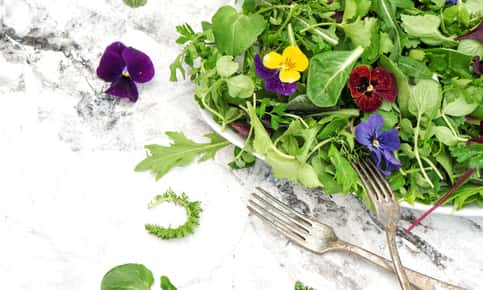
Spring is arriving. The days are getting longer, the air is fresher, and the sunlight is brighter. Flowers and bushes are beginning to bloom. Tree sap is running and there are new baby animals in the world. In short, the world is being renewed and, if we choose to, we too can actively participate in this process of rebirth and rejuvenation.
We can get with nature's program, in a sense, by paying greater attention both to what's happening around us and what our bodies, our instinctive and intuitive selves, are telling us. For example, it's pretty likely that no one's inner physiological self is telling him to eat at a fast-food hamburger place every other day. It's pretty likely that no one's inner bodily compass is telling her to remain sedentary all day long, working all day, staying at home the rest of the time, and never going to the gym or doing any other form of exercise.
On the contrary, our bodies know what's good for us. Without any conditioned responses to get in the way, we would accurately notice our inner inclinations and respond appropriately. For example, in the wild, one never encounters an out-of-shape bird or squirrel. Rhododendrons and roses are never tired or fatigued. Lilacs and lilies never appear listless or depleted. All these living entities get their nourishment directly from the environment. All these living entities are constantly exercising throughout the day; flowers and plants by aligning themselves with the rays of the sun, following the earth's daily rotation, and birds and other animals by engaging in food-collecting, play and preening activities from dawn to dusk.
But humans have mechanization and labor-saving devices. In consequence, we no longer are required to engage in exercise to do our work and obtain sufficient nourishment. As well, in Western societies, we have vastly more food choices available than do our plant and animal friends. It's very easy for us to go long stretches of time without engaging in any vigorous exercise, and it's very easy to make food choices that appeal to our cravings rather than to appropriately reasonable nutrition.
Importantly, we have the ability to realign with nature's imperatives and, in the process, dramatically enhance our overall health and well-being. Such realignment includes eating a nutritious diet, including at least five servings of fresh fruits and vegetables every day and adhering to a weight-maintaining calorie limit of approximately 2000 calories per day for moderately active females and approximately 2500 calories per day for moderately active males. Doing at least 30 minutes of vigorous exercise five days a week is another critical component of our process of getting healthy. As well, obtaining regular chiropractic care helps ensure that our bodies are functioning at peak capacity and able to derive maximum benefit from the good foods we're eating and the time we're spending exercising. Regular chiropractic care ties together all our other health-promoting activities. Your family chiropractor will be able to provide expert guidance and recommendations regarding achieving optimal health and well-being.
- Mellendick K, et al: Diets Rich in Fruits and Vegetables Are Associated with Lower Cardiovascular Disease Risk in Adolescents. Nutrients 10(2). pii: E136. doi:10.3390/nu10020136 2018
- Hannan AL, et al: High-intensity interval training versus moderate-intensity continuous training within cardiac rehabilitation: a systematic review and meta-analysis. Open Access J Sports Med 9:1-17. doi: 10.2147/OAJSM.S150596. eCollection 2018.
- Emary PC, et al: Management of Back Pain-related Disorders in a Community With Limited Access to Health Care Services: A Description of Integration of Chiropractors as Service Providers. J Manipulative Physiol Ther 40(9):635-642, 2017
